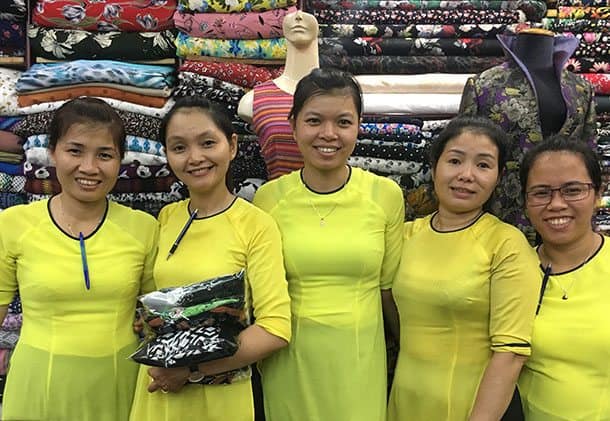Part of the fun when shopping at markets is haggling to get the best price. But it can also be an anxious shopping experience if you’re not used to this practice and feel uncomfortable trying to haggle a vendor down and walk away with a bargain.
I have listed my best tips for haggling at the markets below, but I want to say right at the start, sometimes getting the best price isn’t necessarily the best thing to do.

Ethical shopping
Sometimes quibbling over an extra $1 or $5 or you’ll walk away is not actually that kind.
I like to cajole and enjoy a haggle, but I also know that the vendors I’m talking to are probably just making enough to scrape by and in the next couple of hours I’ll think nothing about leaving a $5 tip for a waitress down the road or spending $15 on a cocktail at a rooftop bar.
I’m just saying, if you want to leave a positive impact on the cities and villages you’re visiting, haggle away by all means, but maybe err on the side of generosity.

When sellers hassle you!
And then there are the vendors who love haggling so much they won’t leave you alone and even follow you through the market offering you better prices. A polite but firm “no thank you” is what you need to say, then walk on and ignore them until they get sick of following you and chase after some other poor soul.
When not to bargain
Of course before you even try and bargain, you need to figure out if it’s appropriate. For example you can’t haggle in shopping malls, restaurants, or even food vendors at markets.
Look for a sign that might say ‘Fixed Price’ and don’t embarrass yourself by even asking for a discount.

I have haggled for bargains (and got great bargains actually!) from Thailand to Turkey, Vietnam to Vanuatu and there are definitely some top tips for ensuring you don’t get ripped off, so here are my 14 best tips for successful haggling:
1 Smile, laugh, cajole. Be polite.
Don’t underestimate how much your manner affects the price you’re going to get. Don’t be afraid to ask for a discount either, they expect it. Go in with a fun attitude to the price and see how they respond. Keep it light hearted and you’ll be surprised.
There are some great places to shop in Hong Kong, markets and malls.

2 Don’t walk away from an early morning negotiation
This is definitely something to keep in mind, as you will find vendors in many Asian countries are very superstitious. You’ll step over offerings in their doorways and notice incense and waving cats placed strategically. But what they also believe is the first sale of the day sets them up to have a good day or a bad day depending on how it goes. So if you’re not serious about that painting or pair of shoes, don’t say a price and then walk away if they agree. Not only is it bad bargaining etiquette, they will be very upset.

3 Compare prices
Don’t fork out your money the first time you see something you like. Chances are the same thing is for sale just around the corner. And if it isn’t, you can always go back. Do a little research and find out what others are selling the items for so you have a better idea of what it’s worth.
4 Offer about half the first price
The general rule of getting the best price at a market is to offer about 40-50% of the opening price and go from there. But if you go too low, you won’t even get the seller trying to negotiate, so be genuine if you do like the item.

5 Look for flaws
If there’s loose threads, non-even glaze, colour runs, cracks, irregularities, (and you can live with them) then you have the power. Not only can you use these to your negotiating advantage, but the seller will be thrilled to get rid of it as the next person would probably not bother to offer anything.
6 Pay cash
Carry local currency, ideally in small denominations. You’ll find it hard to plead poverty when you hand over a $100 note and ask for $80 change! But wave your tenner when he wants $15 and he must just take it.
7 Buy more than one item
If you are wanting two or three items, I never let them know that at the start. I start my negotiating, then when I’m getting the price down to what I think is the lowest they’ll go, I throw in my big gun and ask what price they can give me on two – or more. They really have to offer you a cheaper price then!

8 Know when to stop talking
The pregnant pause is a business negotiating skill which you can employ in a flea market too! Once you’ve told them what you’re prepared to pay, let the seller respond, don’t fill the pause.
9 Keep a poker face
Whatever you do, don’t pick up the item and act like you MUST have it. If it’s a hat or a handbag, by all means try it on and look at yourself in a mirror, but then take it off and put it down or go to hand it back to the seller. It’s all psychology!
10 Be prepared to walk away
If you are unable to get down to a price you feel is acceptable, and maybe you know what it’s worth because other vendors have offered less, be prepared to walk away. The walking away is the true indicator of price. If the vendor calls after you and offers you the price you want, you know you are getting his best price. *Remember, he/she needs to make a living too!

11 Pay up!
If the vendor agrees to your price, do not walk away. You have made an agreement, you need to honour it. However if you really don’t want it, even for the price you initially said, this is where your jovial attitude will get you out of all sorts of accidental purchases.
12 Shop late in the day
Conversely to the bargains you might get (or not get given their superstitions) at the beginning of the day, the end of the day is a great time to scoop up a bargain. When the vendor is ready to go home, tired and doesn’t want to pack everything up, you’re likely to get stupidly good bargains. Even at cost!

13 Never use your credit card
I learned this the hard way after shopping at a street vendor in Florence, Italy any using my credit card. (Ok I was 20!) A week after I got back to London there was a charge on my statement of £700. The vendor had done an extra sneaky zip zap of my card and added another figure later! Fortunately MasterCard accepted that the purchase was fraudulent (my passport showed I was back in the UK when the transaction was made) and reimbursed me. Never use your credit card in a market.
14 Shop with a local
This is the best way to ensure you’re getting the best price. If it’s at all possible, take a local with you. My cousin Kate and I met up with a family friend in Istanbul who lived there and took us to the Grand Bazaar. It can be overwhelming in there with about 4000 stalls, but with Idris by our side we breezed through and got great prices on ceramics and glass lamp shades. The next day we went back just the two of us and not only were we harangued every five metres, but no one offered us their best prices!

Beware of buying fakes!
A lot of countries have clamped down on buying knock offs and you may well be stopped at customs in China or even arrested in Italy for buying fakes like handbags and watches.
I heard recently of a lady who went from Hong Kong into China to shop at a well known mall that specialises in knock offs. When she left to come back into Hong Kong she was stopped at customs on the Chinese side, searched and had her purchases confiscated plus fined $400. Not to mention the time she spent being questioned.
I’ve also heard of tourists in Venice being arrested for buying fake handbags and fined €300. They might as well have bought an original for that price!
Consequently I no longer visit stalls selling fakes and I won’t be taking my tour groups to any outlets that do either, lest I lose one of my ducklings!
I did take my group in Vietnam to have clothes made and met a lovely lady called Dong (yes the name of their currency!) in a shop in Hoi An.

